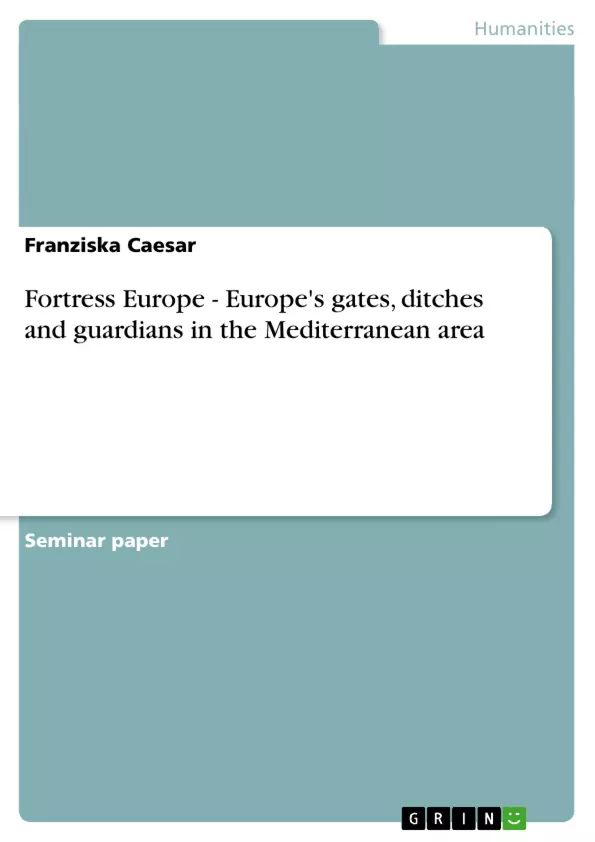Content
Introduction ………………………………………………………………………….….….. 3
1. The huge wave of immigration into Europe ………………………………………....… 4
2. 1 The Euro- Mediterranean region: an area of conflict …………………………..... 6
2. Fortress Europe - A “Fortress of minds”? ………………………………………….…. 9
2.1 The guardians: borders and camps ……………………………………………….10
2.2 Humanitarian arguments ……………………………………................................12
Conclusion: The immigrant "Other” as threat or chance? ………………………..…… 13
Bibliography …………………………………………………………………………..…… 15
Introduction
When we think of the Euro-Mediterranean region, we might imagine places of blithe holidays. However, they are also places of fright, capsized boat people from North Africa, drowning or dying of thirst in rickety and overloaded vessels. In the hope of finding a better future in Europe, they desperately expose their lives to the forces of the sea. Nevertheless, the public sphere is rather casually informed about these tragedies and even tends to apathy and insensitivity due to ostensibly constant and similar reporting about boat tragedies.
Especially in these days of radical changes in the Arabic world including halting establishment of better living conditions and daily cruelties in Syria, many people demand that their outcry for freedom should gain attention in nearby Europe. Acting from necessity, people from North Africa, the Middle East and Asia set off towards Europe in hopes of a better life. Once knocking on Europe's gates at the coast lines of Spain, Italy or Greece, they suddenly have to realize that what they encounter, is in fact not the expected paradise,
Just recently, an Amnesty International Report published in December 2012 strongly condemned the "shameful and terrible" situation of refugees in Greece. It marks yet another alert signal to speak about a European humanitarian crisis; not outside the borders, but within. According to the report, refugees in Greece, originating from Africa, Pakistan, Iran or Syria are not even being provided with the minimum standard of protection and security. Against the background of the financial crisis the situation is getting more dramatic in Greece. Racist street violence, fascist resurgence and radical actions by Greek patrol boats in the border river Evros between Turkey and Greece testify human right violations. Such tendencies not count for Greece solely, they are characteristic for European encounters with enormous immigration waves in general. ...
Inhaltsverzeichnis (Table of Contents)
- Introduction
- The huge wave of immigration into Europe
- The Euro-Mediterranean region: an area of conflict
- Fortress Europe - A "Fortress of minds"?
- The guardians: borders and camps
- Humanitarian arguments
- Conclusion: The immigrant "Other" as threat or chance?
Zielsetzung und Themenschwerpunkte (Objectives and Key Themes)
This paper aims to illuminate the challenges of European migration policy and to challenge fortress-like models. It examines the influx of immigration into Europe, exploring the terms and data related to refugees and illegal immigration. Additionally, it analyzes "Fortress Europe" from both a theoretical-cultural and practical perspective, considering the role of borders and humanitarian arguments. Finally, the paper explores the complex relationship between immigration and identification, examining the threats and opportunities attributed to immigrants.
- The challenges of European migration policy
- The influx of immigration into Europe
- The concept of "Fortress Europe"
- The role of borders and humanitarian arguments
- The relationship between immigration and identification
Zusammenfassung der Kapitel (Chapter Summaries)
The introduction highlights the tragic reality of immigration in the Euro-Mediterranean region, where people risk their lives for a better future in Europe. It discusses the public's apathy towards this issue, especially in the context of the ongoing crisis in the Arab world.
The first chapter provides an overview of the different categories of international immigration, focusing on illegal migrants, refugees, and asylum seekers. It defines the term "refugee" based on the 1951 Geneva Convention and explores the complexities and contradictions surrounding its application in practice. It also discusses the right to protection against forcible return or refoulement, as outlined in the Convention.
Schlüsselwörter (Keywords)
This paper focuses on key concepts related to immigration, including refugee status, illegal immigration, "Fortress Europe," border enforcement, humanitarian arguments, and the immigrant "Other." It also explores themes of identification, self-conception, and the complexities of the Euro-Mediterranean region.
Frequently Asked Questions
What does the term "Fortress Europe" signify in this context?
It refers to the restrictive migration policies of the European Union, characterized by strict border controls and camps, aimed at deterring immigration from North Africa and the Middle East.
How is a "refugee" defined according to the 1951 Geneva Convention?
A refugee is someone who has a well-founded fear of being persecuted for reasons of race, religion, nationality, or political opinion and is outside their country of nationality.
What are the main humanitarian arguments regarding the Mediterranean crisis?
The arguments focus on the life-threatening conditions of boat people, human rights violations at borders, and the moral obligation to provide protection and security to those fleeing conflict.
Why is the Euro-Mediterranean region considered an area of conflict?
It is a zone where political instability in the Arab world meets European border enforcement, leading to tragic boat accidents and humanitarian crises within EU borders.
What is the "immigrant Other" as discussed in the conclusion?
It explores whether immigrants are perceived as a threat to European identity or as a chance for cultural and economic growth, highlighting the complexity of identification.
- Arbeit zitieren
- B.A. European Studies Franziska Caesar (Autor:in), 2013, Fortress Europe - Europe's gates, ditches and guardians in the Mediterranean area , München, GRIN Verlag, https://www.grin.com/document/212331



